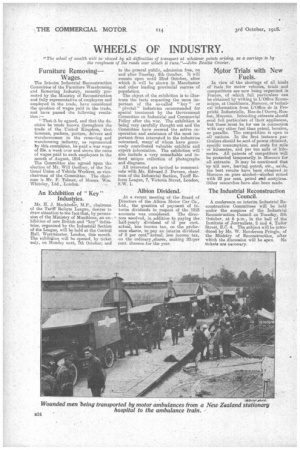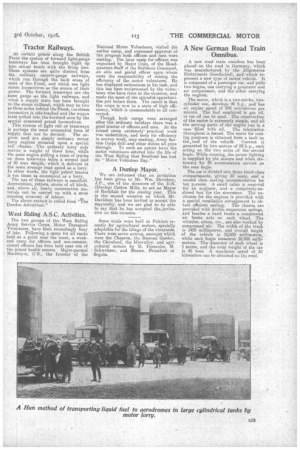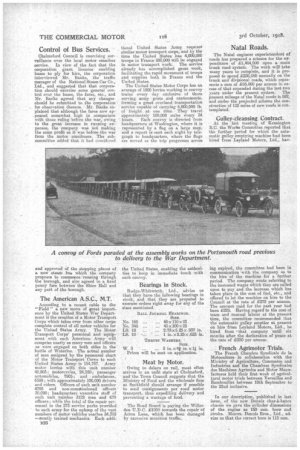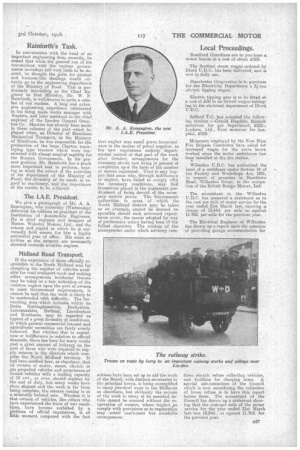WHEELS OF INDUSTRY.
Page 4

Page 5

Page 6

Page 7

If you've noticed an error in this article please click here to report it so we can fix it.
"The wheel of wealth will be slowed by all difficulties of transport at whatever points arising, as a carriage is by The roughness of the roads over which it rans."---sTohn Beattie Crosier,
• Furniture Removing— Wages.
The Interim Industrial .Reconstruction Committee of the Furniture Warehousing and Removing Industry, recently promoted by the Ministry of Reconstruction• and fully representative of employers and employed in the trade, have considered the question of wages paid in the trade, and have passed the following resolution :—
" That it be agreed, and that the decision be made known throughout the trade of the United Kingdom, that foremen, packers, porters, drivers and warehonsemen in the removing and warehousing industry, as represented by this committee, be-paid a war wage of 25s. a week over and above the rates of wages paid to such employees in the month of August, 1914." The Committee also agreed upon the election of Mr. Will Godfrey, of the Na'. tional Union of Vehicle Workers, as vicechairman of the Committee. The chairman is Mr. F. Tabiler, of Mcsars. Wm. Whiteley, Ltd., London.
An Exhibition of " Key " Industries.
Mr. H. J. Mackinder, M.P., chairman of the Tariff Reform League, desires to dra-w attention to the fact that, by permis sion of the Ministry of Munitions, an ex hibition of British and "key" indus
tries, organized by the Industrial Section of the League, will be held at the Central Hall, Westminster, London, this month. The exhibition will he opened, by ticket only, on Monday next, 7th October; and to the general public, adinisSion free, on and after Tuesday. 8th October. It will remain open nntil 22nd October, after which it will be shown in Manchester and other leading provincial centres of population.
The object of the exhibition is to illustrate the facts respecting the more important of the so-called " key " or pivotal" industries recommended for special treatment by the Government Committee on Industrial and Commercial Policy after the war. The exhibition is being very carefully thought out and the Committee have secured the active cooperation and assistance of the most important firms interested in the industries concerned, many' of whom have generously contributed valuable exhibits and expert information. The exhibition will also include a very remarkable and indeed unique collection of photographs and diagrams.
AU interested are invited to communicate with Mr. Edward J. Duveen, chair• man of the Industrial Section, Tariff Reform League, 7, Victoria Street, London, S.W. 1.
Albion Dividend.
At a recent meeting of the Board of Directors of the Albion Motor Car Co., Ltd., the question of payment of interim dividends in respect of the 1918 accounts was considered. The directors esolved, in -addition to paying the half-yearly dividend of 13 per cent. actual, less income tax, on the preference shares, to pay an interim dividend of 5 per centnictnal, less income tax, on the ordinary,ehares, snaking 20,per cent-. thereon.for the year.
M9tor Trials with New Fuels.
In view of the shortage of all kinds of fuels for motor vehicles, trials and competitions are flowbeing organized in France, of .which full particulars can be obtained by writing to L'Office Econoirnique, at Casablanca, Morocco, or technical information from L'Office de la Propriete: Indu.strielle, Rao de l'Oumq, Ruabat, Morocco. Intending entrants should send full particulars of their appliances, but these must be for use in connection with any other fuel than petrol, benzine, or paraffin. The competition is open to all nations. In the first instance particulars should be sent of power obtained, specific consumption, and costs for mile
. or kilometre, and per ton mile or kilometre. All patents of competitors will be protected temporarily in 'Morocco for all entrants. It may be mentioned that op till now, leaving petrol, etc., aside, the beet results have been obtained in Morocco on pure alcohol—alcohol mixed with 22 per cent, petrol aqui acetylene. Other researches have also been made.
The Industrial Reconstruction Council.
A conference on interim Industrial Reconstruction Committees will be held under the auspices of the Industrial Reconstruction Council on Tuesday, 8th October, at 6 p.m., in the hall of the Institute of Journalists, 2 and 4, Tudor Street, E.C. 4. The subject will be introduced by Mr. W. Henderson Pringle, of the Ministry of Reconstruction, after which the discussion will be open. No tickets are necessary.
Tractor Railways.
At certain points along the British Front the system of forward light-gauge tramways has been brought right up into actual touch with the firing line. These systems are quite distinct from the ordinary narrow-gauge railways, which run through the back areas of most of the Front, and which use light steam locomotives as the source of their power. The forward tramways are the same gauge as the light railways, and when a supply train has been brought to the steam railhead, which may be two or three miles behind the Front, use steam locomotive is side-tracked and the wagon train pulled into the forward area by the special armoured petrol locomotives.
This system of tight rail or tramways is perhaps the most economical form of supply that can be devised. The engines used are simply ordinary motor lorry engines mounted upon a special rail chassis. The ordinary lorry only carries a weight of three tons, while the same engine pulling a train of trucks on these tramways takes a normal load of 30 tons *eight, which it delivers at the same average road speed as a lorry. In other words, the light petrol tractor is ten times as economical as a lorry. The use of these railways is manifold. Ammunition, rations, stores of all kinds, and, above all, heavy construction materials can be carried up with a most amazing economy of labour.
The above extract is culled from "'The Dundee Advertiser."
West Riding A.S.C. Activities.
The two groups of the West Riding Army Service Corps, Motor Transport Volunteers, have been exceedingly busy of late. Following a camp for all ranks held at a point near the coast, a weekend camp for officers and non-commissioned officers has been held near one of the inland health resorts. Major-general Maclntyre, CB., the founder of the National Motor Volunteers, visited the earlier camp, and expressed approval of the progress both officers and men were making. The later camp for officers was organized by Major Cope, of the Headquarters.Staff of the Northern Command, an able and genial officer upon whom rests the responsibility of raising the efficiency of the motor volunteers. He has displayed enthusiasm in his task, and this has been reciprocated by the volunteers who have risen to the occasion, and made the moat of the splendid opportunities put before them. The result is that the corps is now in a state of high efficiency, which is commendable to all concerned.
Though both camps were arranged after the ordinary holidays there was a good muster of officers and men. At the inland camp exteemelyi. practical work' was undertaken, and tests for efficiency in convoy work, map reading, Army Service Corps drill and other duties all gone through. To such an extent have the motor volunteers entered into tho life of the West, Riding that, Bradford has had its "Motor Volunteer Day."
A Dunlop Mayor. •
We are .informed that an invitation has been given to Mr. Wm. Davidson, J.P., one of the directors of the D.R. (Dunlop) Cotton Mills, to act as Mayor of Rochdale for the corning year. This is the second occasion on which Mr. Davidson has been invited to accept the mayoralty, and we are glad to be able to say that he has accepted the„invitation on this occasion.
Some trials were held at, Poitiers recently for agricultural motors, specially adaptable for the tillage of the vineyards. There were seven entries, amongst which were the Chapron, the Beeman Gaeden, the Cleveland, the Miswalley, and agricultural motors by M. Dessaules, M. Schweitzer, and Messrs.: Prancfort et Seguin.
A New German Road Train Omnibus.
A new road train omnibus has been placed on the road in Germany, which was manufactured, by the Allgemeine Elektriza,ets Gesellschaft, and which represent a TIOW type of motor vehicle. It is composed of a passenger car, and pulls two bogies, one carrying a generator and air compressors, and the other carrying the engines.
The motor, which is a two-stroke, twocylinder one, develops 90 h.p., and has an engine speed of 500 revolutions per minute. The fuel employed is gas oil, or tar oil can be used. The construction of the motor is extremely simple, and all the moving parts of the engine run in a
casefilled with oil. The, lubrication throughout is forced. The water for cooling purposes is obtained from a tank on
the, roof of the vehicle. Current is generated by two motors of 80 h.p., each acting on the two axles of the second bogie. While running, the power lighting is supplied by the motors and when stationary by 30 accumulators carried on the rear bogie.
The car is divided into three third-class compartments, giving 30 seats, and a second class seating accommodation for ten pasons. A small cabin is reserved for an engineer, and a completely-enclosed box for the steersman. The enclosure for the engines is provided with a special ventilation arrangement to ob tain efficient cooling: The chassis are provided with double suspension springs, and besides a hand brake a compressed air brake acts on each wheel. The whistles, sirens, etc., are also worked by compressed air. The width of the track is 1.435 millimetres, and overall length of the vehicle is 16,500 millimetres, while each bogie measures 10,500 millimetres. The diameter of each wheel is 1 metre, and the total weight of the ear is 45 tons. A maximum speed of 50 kilometres can be obtained on tits road.
Control of Bus Services.
Chelmsford Council is exercising surveillance over the local motor omnibus service. In view of the fact that the corporation grant licences enabling buses to ply for hire, the corporation interviewed Mr. Banks, the traffic manager of the National Steam Car Co., Ltd., and suggested that that corporation should exercise some general control over the buses the fares, etc. and Mr. Banks agreed that any changes should be submitted to the corporation for observation thereon. Mr. Banks explained that although the fares now ap.peared somewhat high in comparison with those ruling before the ware owing to the great increase in running expenses, the company was not making the same profit as it was before the war from the motor omnibuses. The subcommittee added that it had ennidred
and approved of the stopping places of a new steam bus which the company proposes to commence running through the borough, and also agreed to a fixed penny fare between the Shire Hall and any part of the borough.
The American A.S.C., M.T.
According to a recent cable to the "Field" a new move of great importance by the United States 'War Department is the creation of a Motor Transport Corps which takes over from other corps complete control of all motor vehicles for the United States Army. The Motor Transport Corps' personnel and equipment with each American Army will comprise nearly as many men and officers as were engaged on both sides in the battle of WaterlooThe actual number of men assigned by the personnel chart of the Motor Transport Corps to each United Slates Army is 154,747. Army motor lorries with this unit number 40,803; motorcycles, 24,250; passenger automobiles, 7905; and ambulances, 6598; with approximately 100,000 drivers and riders. Officers of each unit number 4298 and non-conneissioned officers 30.090; headquarters executive staff of each unit number 3122 men and 679 officers ; while the total of the repair personnel in the 273 service parks provided to each army for the upkeep of the vast numbers of motor vehicles reaches 34.319 —mostly trained mechanics. Each addl. B28 tional United States Army requires similar motor transport corps, and by the time the United States has 4,000,000 troops in France 500,000 will be engaged in motor transport work. The service already has accomplished great work, facilitating the rapid movement of troops and supplies both in France and the United States.
The United States Motor Corps has an average of 1500 lorries working in convoy trains every day exclusive of those serving army posts and cantonments, forming a great overland transportation service capable of carrying 6,000,000 lb. of • freight . at one time. They travel approximately 100,000 miles every. 24 ' hours. Each convoy is directed from headquarters at Washington, where it is represented by a flag on a large map, and a report is sent each night by telegraph to headquarters, where the flags are ninved as the trip progmtse.s across the United States, enabling the authorities to keep in immediate touch with each convoy.
Bearings in Stock.
Rudge-Whitworth, Ltd., advise us that they have the following bearings in stock, and that they are prepared to execute orders right away for any of the sizes mentioned.
BALL JOURNAL rfEARINGS.
SIZE.
No. 160 ... 60x110x 22 No. 345 ... 45 x 100 x 25 LS. 18 ... ... 2.75 x 5.2,5 x .937 in.
1 in. x 2.25 x .625 in.
THRUST WASHERS.
• SIZE.
W. 3 ... 3 in_ x 4i in. x 1 in. Prices will be sent on application.
Meat by Motor.
Owing to delays on rail, meat often arrives in an lin& state at Chelmsford, and the Town Council suggests that the Ministry of Food and the wholesale firm at Smithfield should arrange if possible to send consignments per road motor transport, thus expediting delivery and preventing a wastage of food.
The Road Board is paying the Willesden U.D.C. £1000 towards the repair of Acton Lane, which has been damaged by excessive munition traffic.
Natal Roads.
The Natal engineer superintendent of roads has prepared a scheme for the expenditure of £1,404,000 upon a main trunk road system. The work will' take many years to complete, and it is proposed to spend £226,000 annually on the trunk and divisional roads, which represents a sum of £85,000 per annum in excess of that expended during the last two years under the present system. The present mileage of the Natal roads is 592, and under the projected scheme the construction of 122 miles of new roads is contemplated.
Gulley-cleansing Contract.
At the last meeting of Kensington B.C. the Works Committee reported that the further. period for which the automatic gulley emptying machine had been hired from Leyland Motors, Ltd„ hay
ing expired, the committee had been in communication with the company as to the hire of the machine for a further period. The company wrote referring to the increased wages which they are called upon to pay and the increase which has taken place in the cost of fuel, etc., and offered to let the machine on hire to the Council at the rate of £275 per annum. The amount paid for the past year had been £225. Having regard to the cost of team and manual labour at the present time, the committee recommended that the automatic gulley emptier at present on hire from Leyland Motors, Ltd., be hired from 'that company until six months after the declaration of peace at the Tate of £250 per annum.
French Agrimotor Trials.
The French Chambre Syndicate de in Mothculture in collaboration with the Ministry of Agriculture, Commerce and Industries and the Chambres Syndicates des Machines Agricoles and Motor Manufactures held their first week of agricultural motor trials between Versailles and Rambouillet between 19th September to the 22nd inclusive.
In our description, published in last issue, of the new Dennis char-i-bancs chassis we gave the cylinder dimensions of the engine as 150 mm. bore and Stroke. Messrs. Dennis Bros., Ltd., advise us that the correct bore is 115 mm.
Rainforth's Task.
In conversation with the head of an important engineering firm, recently, he stated that while the general run of his transactions with the various governments nowadays left very little to be desired, he thought the palm for prompt and business-like dealings would certainly go to the engineering department of the Ministry of Food. This is particularly interesting as the Chief .Engineer to that Ministry, Mr. W. F. Rainforth, is well-known to quite a number of our readers. A long and extensive engineering experience culminated in hie being made works manager with Napiers, and later assistant to the chief engineer of the London General Omnibus Co. Mention has already been made in these columns of the part which he played when, as Director of -Munitions .Mechanical Transport, in the Ministry of Munitions, he was responsible for .the production of the large Clayton tracklaying type tractors which were Constructed with ahnoet magical rapidity for the Russian Government. In his prosent position, Mr. Rainforth hits a much more important task to perform, bearing in mind the extent of the activities of his department of the Ministry of Food, tho•diversity of its needs in regard to machinery, and the importance of the results to be achieved.
. The I.A.E. President.
We give a photograph of Mr. A. A. Remington, who yesterday(Wednesday) delivered his address as president of the Institution of Automobile Engineer& He is chief engineer and designer of Messrs. Wolseley Motors, Ltd., and the esteem and regard in which he is universally held ensure for him a highly successful year of office. His main activities at the moment are necessarily directed towards aviation engines.
Midland Road Transport.
If the experience of those officially re. .spoifsible in the North Midland area for compiling the register of vehicles available for road transport work and snaking other arrangements incidental thereto may be takenas a fair indication of the common neglect upon the part of owners to meet Government requirenients, it cannot be said that, the work is likely to be unattended with difficulty. The far. reaching area which includes within its limits Nottinghamshire, Derbyshire, Leicestershire, Ruth:rid, Lincolnshire and Northants. may be regarded as typical of a great diversityof conditions, in which general commercial interest and agricultural necessities are fairly evenly balanced. But whether due to supineness or iudifference in relation to official demands, there has been for many weeks past a great amount of lethargy on the part of those who were required to sup• ply returns in the dietricts which comprise the North Midland territory. It had been notified here, as elsewhere, that all owners of motor, steam, electric or gas propelled vehicles and proprietors_of horsed vehicles with a loading capacity of 15 cwt. or over, should register by the end of July, but many weeks have since elapsed and the work is far from being complete, the returns coming in at a miserably belated rate. . Whether it is that owners of vehicles, like others who have experienced the force of war conditions have become surfeited by a plethora of official regulations, is of little moment compared with the fact that neglect may entail grave inconvenience in the matter of petrol supplies, as the 'new regulations embody departmental control of that part of the work after October, arrangements for the necessary stocks now being in process of completion upon the basis of the number of motors registered. Thus it may happen that some who, through indifference or neglect, have failed to comply wIth the necessary conditions, may find themselves placed in the unpleasant predicament of' being devoid of the necessary motive power. The Government authorities in areas of which the North Midland district may be taken as an example, cannot be deemed responsible should such untoward experiences occur,. the means adopted by way of preliminary notice haVing been of the fullest character. The wisdom of the arrangement under which advisory corn . mittees have been set up to aid the work of the Board, with distinct secretaries in the principal towns, is being exemplified in many practical ways in the Midlands as elsewhere, but obviously the success of the work in many of its essential details cannot be ensured without the cooperation of owners, whose -neglect oto comply with provisions as to registration may entail unp!easant but avoidable consequences.
Local Proceedings.
Bradford Guardians are to purchase a motor hearse at a cost of about £300.
The Sentinel steam wagon ordered by Ilford U.D.C. has been delivered, and is now in daily use.
Manchester Corporation isto purchase for the Electricity Department a. 31-ton. ' electric tipping wagon.
Electric tipping gear is to be fitted ata cost of £50 to an Orwell wagon belonging to the electrical department of Ilford U.D.C.
Salford T.G. has accepted the following tenders 1—Gerald Dugdale, Renault motorvan for gas department, £225; Lookers, Ltd., Ford motorcar for hospital, L253.
Motormen employed by the East Ham Fire Brigade Committee have asked for increaeed wages for the extra hours worked since the motor ambulance has been installed at the flue station.
Willesden U.D.C. has authorized the issue of a certificateunder Section 14 of the Factory and Workshops Act, 1901, in respect of .premuies in. Hawthorn Road,Willesden Green, in the occupation of the British Ensign Motors, Ltd:
The accountant to the Willesden I.J.11.C.. has prepared a. statement as to the cost per mile of motor service for the year ended 31st March last, showing a charge of 13.64d. per mile as against 11.70d. per erdle for the previous year.
The Electrical Engineer a Willesden has drawn up a report upon the question. of providing garago accommodation for three electric refuse collecting ,vehicles, and facilities for charging mime. A special sub-committee of the Council which is now considering, the collection. of house refuse is -to have this report before them. The accountant of the Council has drawn up a statement showing that the costlier mile of the motor service for the year ended 31st March last' was 13.64d., as against 11.70d for the previous year.






















